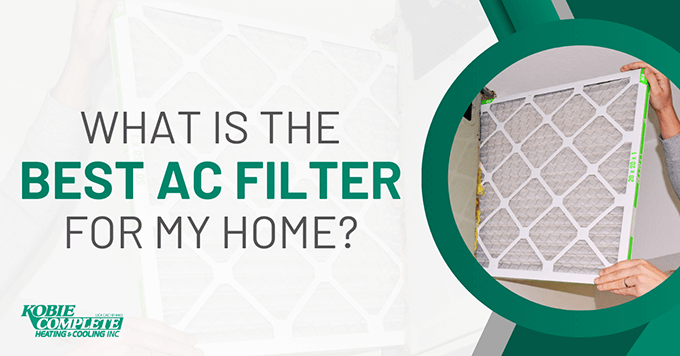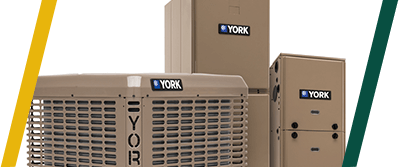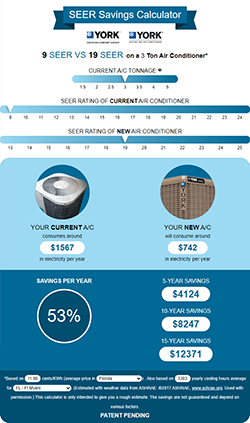
Choosing the best AC filter is like shopping for a pair of running shoes. You want a balance between the right fit, optimal performance, and a good price. This can be a daunting task, considering the variety of filters available. We’ll walk you through the options and help you identify the best filter for your home.
Air Conditioning Filters 101
Every central air conditioning system has at least one filter. You can find your filter either at the return vent (or vents – some homes have up to four) or inside the air handler, before the coil. The filter is responsible for capturing dust and other airborne particulate matter.
If you don’t have a filter, or if your filter is the wrong size, these particles build up on the coil or inside your ducts, creating problems for your AC system. As you can imagine, some of the dust and other particles also end up circulating through your home. The result? You’ll need to wipe down surfaces more often, and the excess dust and pollutants can aggravate allergies or cause other respiratory issues.
How to Choose an AC Filter
An AC filter’s function is easy to grasp, but the hard part is knowing what filter to choose. To make the best selection, you’ll need to understand what size filter you need, how much filtration you require, and what type of filter best suits your needs and AC system. First, let’s look at size.
What size filter do you need?
Your HVAC system is designed to accommodate a specific size of filter. Although a few systems may call for a custom filter size, most require one of several standard sizes.
Here’s a (non-comprehensive) list of standard AC filter sizes1 (length x width x depth):
- 16 x 25 x 1
- 20 x 25 x 1
- 20 x 20 x 1
- 16 x 20 x 1
- 20 x 25 x 5
Besides having different width and height dimensions, filters also come in various thicknesses. You can find filter depths ranging from 1”-6”. The thicker the filter, the longer it will last before you need to clean or replace it. However, too thick of a filter will restrict the airflow, causing strain on your AC system. Also, most air conditioners are designed to accommodate 1” filters and a thicker filter will not fit without modifications to the system.
How to Determine Your Filter Size
- Your best option is to look at your current filter. The size may be printed directly on the frame.
- If you don’t see a size on your current filter, consult your air conditioner’s owner’s manual.
- If you’re still unable to determine your filter size, contact your HVAC contractor. When you schedule an AC maintenance visit with Kobie Complete, your technician can tell you what size filter you need and how to change it.
Most importantly, your filter should fit snugly, so no air passes around it. Of course, you should also not try to jam an oversized filter into the slot.
How much filtration do you need?
Air conditioning filters use a MERV (Minimum Efficiency Reporting Values) rating to show their efficacy in capturing particles between 0.3-10 microns in size. A filter can have a MERV rating between 1-20. The higher the number, the more effective the filtration. For instance, a MERV 1-4 filter catches large particles, while smaller particles like fine dust or pet dander will seep right through.
So, why shouldn’t you just choose the filter with the highest MERV rating?
Although filtering out airborne particles is a good thing, especially for allergy sufferers, too much filtration can harm your air conditioner by blocking the airflow.
If you have allergies, asthma, or another respiratory condition, or you’re concerned about the spread of viruses, you should consider an air purifier. There are stand-alone units available that use HEPA (High Efficiency Particulate Air) filtration. HEPA filters have MERV ratings between 17-202. Or, consider a whole-house air filtration system like the REME HALO.
Most HVAC systems are not designed to handle HEPA filters. We recommend selecting an AC filter with a MERV 10 rating (or MERV 12 at maximum) for the best balance of filtration and airflow.
If you want to know more about MERV ratings, the Environmental Protection Agency (EPA) has a chart on their website3 you can check out. We should also note that some brands, like The Home Depot’s filter brand1, use their own rating system.
What type of filter should you choose?
The following is a list of five common types of air conditioning filters:
1. Fiberglass (Standard Panel)
- Maintenance: Disposable, need to be replaced often, usually once a month.
- Cost: Inexpensive.
- Material: Fiberglass, generally with a cardboard frame.
- Availability: Easy to find in most hardware stores and online.
- Efficacy: Not very effective at filtering airborne particles. These filters have very low MERV ratings.
- Uses: Although you can use fiberglass filters for air conditioners, they are more commonly used as furnace filters.
2. Pleated (Extended-Surface)
- Maintenance: Disposable, need to be changed about once every 1-3 months.
- Cost:
- Material: Cotton/Polyester with a cardboard frame.
- Availability: Easy to find in most hardware stores and online.
- Efficacy: Named for their undulating surface, which helps improves air filtration, pleated air filters come in a range of MERV ratings.
- Uses: Commonly used in HVAC systems.
3. Aluminum Mesh
- Maintenance: Permanent, washable.
- Cost: More expensive upfront than fiberglass or pleated filters, but cheaper over time because they are reusable.
- Material: Aluminum
- Availability: These are considered antiquated, but you can still find them at some hardware stores and online.
- Efficacy: These filters provide almost no filtration, for even larger particles.
- Uses: More commonly used in furnaces than in AC systems.
4. Electrostatic
- Maintenance: Washable, lasting up to five years. Some never need replacing.
- Cost: High upfront cost, but considering the long lifespan, these filters are quite inexpensive.
- Material: Metal
- Availability: Hardware stores and online.
- Efficacy: Using a static-electric charge to attract particles like dust, dirt, mold, mildew, or even odors, electrostatic filters are considered highly effective.
- Uses: Air conditioners, furnaces, and portable air purifiers
5. Orange Media
- Maintenance: These filters have a permanent frame with a disposable pad.
- Cost: Higher upfront cost, reasonable replacement cost for filter pads.
- Material: Polyester with a tacky orange side to catch particles.
- Availability: Not available in most stores, generally a special-order item. Kobie Complete sells them to local customers in Sarasota and Charlotte County, Florida.
- Efficacy: These filters are moderately effective at capturing airborne particles, providing a good balance between airflow and filtration.
- Uses: Primarily used in air conditioners.
For most standard central air conditioning systems in Southwest Florida, we recommend pleated (extended) surface filters or orange media filters. Electrostatic filters can also be a good choice if you’d rather clean your filter than throw it out and replace it.
When the filter fits, you and your HVAC system benefit.
Armed with an understanding of the options available, you can purchase your next air conditioner filter with confidence. One final tip – whatever filter you choose, always follow the recommended cleaning and/or replacement instructions for your specific filter. A clean filter improves your air conditioner’s performance, efficiency, and longevity – while also promoting cleaner air in your home.
For further assistance with air conditioning filters, contact your Kobie Complete service technician. Our annual tune-ups include an AC filter, and our technician will be happy to show you how to maintain your filter.
Kobie Complete provide expert air conditioning and heating service in:
Sources:
1“Air Filter Buying Guide”, The Home Depot, https://www.homedepot.com/c/ab/air-filter-buying-guide/9ba683603be9fa5395fab90e10394fb, Accessed 8/24/23.
2“What Are the Differences Between a MERV 13 and a HEPA Filter?”, ISO-Aire, https://www.iso-aire.com/blog/what-are-the-differences-between-a-merv-13-and-a-hepa-filter, Accessed August 24, 2023.
3“What is a MERV Rating?”, Environmental Protection Agency, https://www.epa.gov/indoor-air-quality-iaq/what-merv-rating, Accessed August 24, 2023.
Based on a blog post titled “Which Air Conditioning Filter is Best for My Home?”, published on January 10, 2013.










